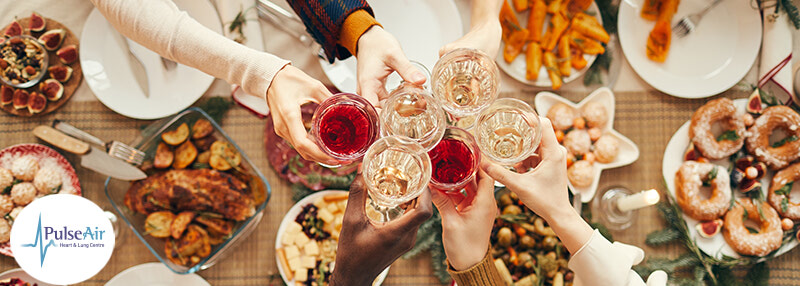The holiday season is upon us, and with it comes a multitude of delicious foods and treats. However, for those with food allergies, this time of year can be particularly challenging. At Pulse Air Heart and Lung Centre, we want to help you enjoy the holiday season while staying safe and healthy. Here are some ways to avoid allergens in food this season:
1. Know The Allergens
The most common food allergens include peanuts, tree nuts, milk, eggs, wheat, soy, fish, and shellfish. Be aware of these ingredients when planning meals and reading labels. Read labels carefully, always check ingredient labels for potential allergens. Look for hidden sources of allergens, as they can sometimes be listed under different names.
2. Communicate with Hosts and Guests
If you're attending a holiday gathering, inform your hosts about your allergies in advance. This allows them to plan and prepare dishes that are safe for you to eat. Also don't hesitate to ask about the ingredients used in dishes. It's better to be safe and ensure that the food is free from allergens.
3. Make Second Dishes
One of the best ways to avoid allergens in food is to make second dishes that are safe for everyone to eat. This can be as simple as making a separate batch of cookies that are free from nuts or dairy products. By making second dishes, you can ensure that everyone has something they can enjoy, regardless of their food allergies.
4. Provide Alternatives
Another way to avoid allergens in food is to provide alternatives to traditional holiday dishes. For example, instead of serving a turkey with stuffing, consider serving a vegan or gluten-free alternative. This can be a great way to include everyone in the meal, regardless of their dietary restrictions.
- Nut-free options: Instead of using peanuts or tree nuts, try using sunflower seeds or pumpkin seeds as a crunchy topping for salads or desserts.
- Dairy-free delights: Offer dairy-free milk alternatives like almond milk, soy milk, or coconut milk for those with lactose intolerance or dairy allergies.
- Egg-free baking: Use flaxseed or chia seeds as egg substitutes in baked goods or try using applesauce or mashed banana as a binding agent.
- Gluten-free goodness: Prepare gluten-free bread, pasta, or baked goods using alternative flours like rice flour, almond flour, or coconut flour.
5. Cook Safely
Avoid cross-contamination by using separate utensils, cutting boards, and cookware for allergen-free dishes to prevent cross-contamination. Clean surfaces thoroughly before preparing allergen-free foods. It’s important to prepare allergen-free dishes first to minimize the risk of cross-contamination. Store them separately from other foods until it's time to serve.
6. Label, Label, Label!
Make sure to label your dish with any known allergens as previously stated, especially if you are aware of attendees who are affected by certain allergens. It could be a small paper sign in front of the dish or displayed on the food’s covering, just make sure it is very visible and apparent.
7. Safety Plan
Have an emergency plan! Always carry any necessary medications, such as antihistamines and a epinephrine auto-injector, in case of accidental exposure. Know the signs of an allergic reaction and be prepared to act quickly.
Stay Safe and Healthy this Holiday Season!
By following these tips, you can create a safe and enjoyable holiday season for everyone, regardless of their dietary needs. Remember, it's always better to err on the side of caution when it comes to food allergies. Happy cooking and feasting!
Here at PulseAir, we administer allergy testing if you and someone in your life is experiencing allergic reaction symptoms, click here to learn more!


